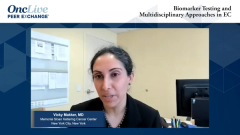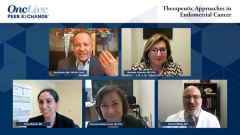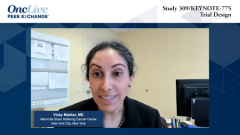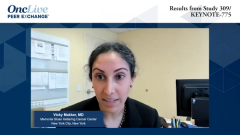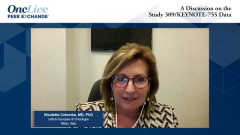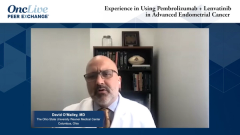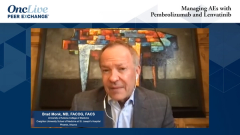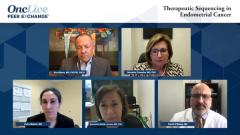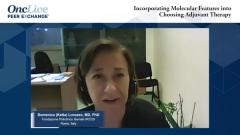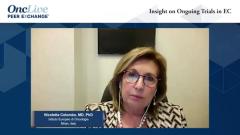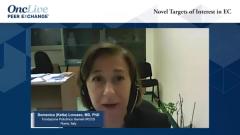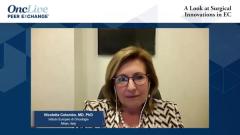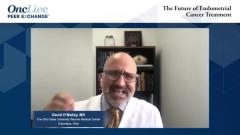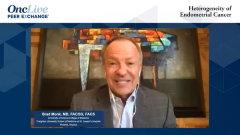
The Future of Endometrial Cancer Treatment
Experts give insight on what they are looking forward to in the endometrial cancer space.
Episodes in this series

Brad Monk, MD, FACOG, FACS: We began this session talking about the future, and I’m really excited that 7 or 8 agents are in the clinic beyond the traditional PD-1 and PD-L1 inhibitors. I’d like to wrap up by hearing from each of you individually about what you’re excited about. What’s your source of excitement in the short term, in the next 1 to 2 years, that will really impact the patient experience? That’s why we do this. Anybody can start. Ketta, what are you most excited about in the next 1 to 2 years?
Domenica Lorusso, MD, PhD: The most important step forward in endometrial cancer treatment is molecular profiling. We really made a great step forward, and we’ll use this information to guide our treatments: surgical treatment, possibly medical treatment, advanced disease treatment. This is the most important step forward, and we performed this more than in the treatment of other tumors—think about treating ovarian cancer and cervical cancer. Endometrial cancer treatment is a step in front of all the others in terms of the ecological malignancies.
Brad Monk, MD, FACOG, FACS: We spent a lot of time on that during this OncLive® conversation because we recognize that education is important. Vicky, you had lots of very good comments—as all of you did. What excited you most though, to boil it down to 1 thing?
Vicky Makker, MD: Firstly, I’m very encouraged that we have the first phase 3 trial that investigated a nonchemotherapy combination in advanced recurrent endometrial cancer and essentially responded to a high unmet need. This is only the beginning. We have to accept that we have really reached the ceiling when it comes to chemotherapy for the management of endometrial cancers—at least advanced endometrial cancers. The many exciting studies that we have discussed teach us that we have much to learn. Surely, these studies will further impact the treatment landscape of advanced endometrial cancer. It’s an incredibly exciting time, and I’m privileged to be a small part of it.
Brad Monk, MD, FACOG, FACS: It’s an honor to be a part of it. Nicoletta, I am going to give you the last word. So Dave, I want to hear from you next.
David O’Malley, MD: What a great group, one I’m honored to be sitting next to. I agree that the molecular signature in the up-front setting is exciting. We can be curing more patients while limiting toxic therapies and providing better quality of life and less long-term morbidity. That’s because of molecular signature. I really must applaud our European colleagues who’ve done a much better job, especially in the up-front setting. Then I challenged you earlier regarding curative and recurrent cancers and endometrial cancers. With these precision therapeutics, these unique combinations, we can cure recurrent uterine cancer in a certain subpopulation. Because of the wonderful work being done by this group and around the world, we can begin identifying those malignancies’ signatures, targeting them, and therefore improving our rate of survival and curative intent, even in the recurrent advanced setting.
Brad Monk, MD, FACOG, FACS: I hope so. Nicoletta, it has been my pleasure to work with you for so many years. You always add such wisdom—as all of you do, don’t get me wrong—so I wanted to save the last word for you.
Nicoletta Colombo, MD, PhD: Like everybody else is, I’m extremely excited. We are amid a very impressive moment for the treatment of endometrial cancer. We’re moving forward. David was saying that we may be able to cure more patients in the recurrent setting, but I hope we’ll be able to prevent more recurrence by individualizing the adjuvant treatment. To me, the more fascinating areas are in the discussion of adjuvant treatment. It’s a long-lasting debate. With this personalized approach, we may be able to reduce the number of cases of recurrent disease. But the data in the recurrent setting are extremely encouraging. We now have efficient and effective immunotherapy for the treatment of advanced endometrial cancer. We have a combination regimen, lenvatinib plus pembrolizumab, that works in serous individual cancer, in nonendometrial cancer. This is very exciting. We have seen the data, and it’s all positive: OS [overall survival], PFS [progression-free survival], response rate duration. It’s exciting. For me, immunotherapy has changed the phase of many cancers during the last few years. Finally, this is happening. For the treatment of endometrial cancer, so I’m very excited.
Brad Monk, MD, FACOG, FACS: This has been so educational and clear, and I hope the audience and those who participated virtually also enjoyed it. On behalf of OncLive® Peer Exchange®, I want to thank all of you. So long for now. Thank you.
TRANSCRIPT EDITED FOR CLARITY


